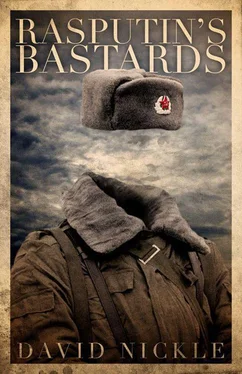Stephen made his fingers into a steeple and stared ahead, blank-faced. Alexei stepped into the room, his own hands folded, in what was for him a gesture of servitude. Mrs. Kontos-Wu was still smiling at him. “All right, Stephen.” She didn’t look at her assistant. “Alexei comes — although I don’t think he’ll be needed. The sea air will do us both good.”
“Where are we going?” said Alexei. “If I may ask.”
“We are going to Boston,” said Mrs. Kontos-Wu. “And from there — who knows?”
Later, in the car from the airport, Mrs. Kontos-Wu had told him a little more. “I’m meeting with a broker,” she said. “He’s a Turk. His name’s Shadak.”
“That is interesting,” said Alexei. He remembered he used to know a Shadak once. Back in Pakistan. Nice guy. Had a pretty girlfriend. But he didn’t say anything.
“He’s — an old friend,” said Mrs. Kontos-Wu. “He has some associates he wants me to meet. I want you to keep an eye on them — they’re Romanian.”
“And?”
“Just keep an eye on them.”
Keeping an eye on the Romanians wasn’t, as it turned out, all that difficult — because when they got to the club where Mr. Shadak’s motor yacht, Ming Lei 3 , was moored, Mr. Shadak was nowhere to be seen. So far as Alexei could tell, the yacht was filled with Romanians, stem to stern, and he could have looked anywhere and counted on seeing at least one. Altogether, Alexei counted a dozen of them by the time they disembarked — five men, ranging in age from maybe twenty-five to fifty; two women, both in their late twenties, and — incongruously — five children, none older than fourteen, the youngest one surely not more than eight. So far as Alexei could tell, the children were engaged as help on the yacht. They moved the baggage, opened doors and even offered to serve a selection of spirits once he and his employer had settled in.
Mrs. Kontos-Wu seemed unperturbed at the arrangement. One of the Romanians, a balding stork of a man who introduced himself as Mr. Hzekul, told them that Mr. Shadak would be joining them tomorrow, and when Alexei quietly voiced his skepticism at just how Mr. Shadak would do this if they were to be at sea, Mrs. Kontos-Wu waved his suspicions away.
“This isn’t unusual,” she said. “Not that unusual, not for Mr. Shadak.”
“I will keep an eye on them,” said Alexei, “all the same.”
Ming Lei 3 debarked from Boston Harbour late in the afternoon, and it was warm enough for Mrs. Kontos-Wu to change into a shorts and a light cotton shirt, to bid the land adieu. Alexei wished he could do the same — the afternoon sun was hot, particularly as it beat down on his dark suit jacket. But he was worried about the Romanians. He’d worked alongside some of them in the old days, and from everything he’d heard, Romanians in general and their Securitat in particular were still among the shiftiest bastards in the Eastern Bloc. And given that — and the little premonitory crawl that moved up and down Alexei’s back like a line of feeding ants — there just weren’t enough places to hide what he deemed to be the necessary arsenal in a pair of swimming trunks.
So Alexei sweated the afternoon out, sipping on ginger ale and watching the Boston skyline shrink on the horizon behind them. A little girl, maybe eleven, with wide black eyes set in a gaunt and serious face, hovered around him like a mayfly, forever tempting him with food and hard liquor in horribly broken English: “Cawiar?” “Meester want wodka?” “Shreemp?” “Hawe weeskie now?”
“No,” he would say, “nothing for me.” But she would persist — much to Mrs. Kontos-Wu’s amusement, if not Alexei’s.
“She’s a little professional,” she drawled to Mr. Hzekul as she sipped at her own martini, just mixed by a fourteen-year-old boy with a little s-shaped scar on his chin, and hair, like the rest of them, jet black.
“As is your man, I see,” said Mr. Hzekul, leaning close to Mrs. Kontos-Wu. His fingers brushed the bare flesh of her arm in a way that made Alexei tense, and Mr. Hzekul must have sensed this. He turned to Alexei, smiling broadly. “Good! Do not drink on duty! Always on guard. Good policeman, yes?”
“As you say, sir.” Alexei smiled and bent slightly at the waist. Mr. Hzekul leaned back against the seat cushion, and sipped at his own drink: a Canadian beer, which he drank straight from the can.
Behind them, the line of land vanished and the sea air sent an evening chill across the deck. Before Mrs. Kontos-Wu could even comment, another child came scurrying from the cabin with a blanket. Mrs. Kontos-Wu accepted it readily, and smiled her thanks as she wrapped it around her shoulders. This child was the smallest yet, so young and dressed so androgynously that Alexei couldn’t even tell whether it was a boy or girl. The child vanished inside, and Alexei, his professional attention fixed on the lecherous Mr. Hzekul just then, didn’t give it much thought.
I should have , he thought a day later, lying in a bunk on board Holden Gibson’s boat and fingering his bandaged scalp.
That night, for instance, every instinct had told him to be out on deck. Mrs. Kontos-Wu had again dismissed his concerns for her well-being where Mr. Hzekul was concerned; even suggested playfully that Alexei might have been a bit jealous. “But you have nothing to fear,” she said, and shuddered theatrically. “He’s not my type.”
Alexei had blushed, and Mrs. Kontos-Wu had laughed and winked and sent him out the door. “Go be a guard,” she said. “But leave Mr. Hzekul alone. This business will all be done soon enough.”
“What is this business?” asked Alexei — realizing even as he said it that he had stumbled across an invisible line of decorum. It was a line he’d managed to avoid for three months — that one between employee and associate — but tonight… “I am sorry—” he began.
“Go guard,” said Mrs. Kontos-Wu firmly, and shut the door.
Ah shit , he’d thought. That’s why you never made the Party. No sense of politics… or the politic.
So Alexei went up on deck. He didn’t know what he expected to see, but he didn’t feel at all right about things as they stood, and he’d done everything he could below: swept Mrs. Kontos-Wu’s cabin for listening devices, put a contact alarm on her door-frame, checked the battery in her panic button. All that was left, he supposed, was for a crew of Romanian assassins to come aboard clandestinely. And anyway, here was where his gut told him to be.
The weather had shifted mightily since sunset. By midnight, when Alexei emerged from below, the calm clear summer sky was replaced by rolling black clouds and the air was filled with sharp, cold rain. He fished a Maglite from his jacket pocket and played the beam across the water-splashed deck. There was a faint light up in the cabin, where one of the Romanian adults held the wheel, but it wasn’t much brighter than Alexei’s own flashlight, and otherwise the boat was entirely dark. Which struck him as odd — wasn’t there some kind of maritime law requiring ships to run lights through the night?
A scuffling sound brought him to attention. It came from the gangway around the main cabin, toward the foredeck, but when he shone his light in the sound’s direction, there was nothing there but the misting rain.
Alexei shifted the Maglite to his left hand and drew his Glock from its shoulder holster. He shut the light off, and when he judged his eyes had adjusted well enough to the darkness he started to make his way along the edge of the boat.
The bow was as dark as the rest of the vessel. He nearly tripped over the dingy as he moved from the gunwale towards the middle of the boat, and when he righted himself he kept down on one knee — the deck here was curved, and his stomach twisted as he realized it wouldn’t take much for him to slide off it and end up freezing to death in Ming Lei 3 ’s wake — or perhaps more mercifully, chopped into shark chum in its propeller.
Читать дальше












